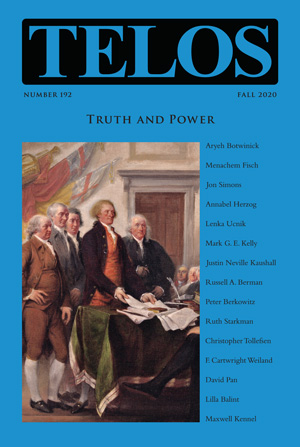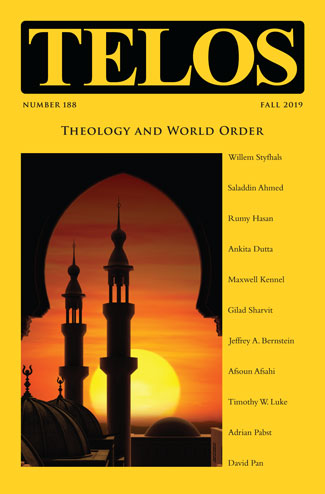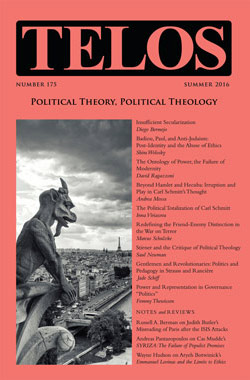By Telos Press · Tuesday, January 26, 2021 In today’s episode of the Telos Press Podcast, Camelia Raghinaru talks with Aryeh Botwinick about his article “Negative Theology, Power, and the Israeli–Palestinian Conflict,” from Telos 192 (Fall 2020). An excerpt of the article appears here. If your university has an online subscription to Telos, you can read the full article at the Telos Online website. For non-subscribers, learn how your university can begin a subscription to Telos at our library recommendation page. Purchase a print copy of Telos 192 in our online store.
Listen to the podcast here.
Continue reading →
By Telos Press · Thursday, January 14, 2021 In today’s episode of the Telos Press Podcast, Camelia Raghinaru talks with Annabel Herzog about her article “When Arendt Said ‘We’: Jewish Identity in Hannah Arendt’s Thought,” from Telos 192 (Fall 2020). An excerpt of the article appears here. If your university has an online subscription to Telos, you can read the full article at the Telos Online website. For non-subscribers, learn how your university can begin a subscription to Telos at our library recommendation page. Purchase a print copy of Telos 192 in our online store.
Listen to the podcast here.
Continue reading →
By Jon Simons · Friday, October 16, 2020 Jon Simons’s “Divine Violence, Profane Peace: Walter Benjamin, Rabbis for Human Rights, and Peace in Israel–Palestine” appears in Telos 192 (Fall 2020): Truth and Power. Read the full article at the Telos Online website, or purchase a print copy of the issue in our online store. Individual subscriptions to Telos are available in both print and online formats.
 One of the reasons for disaffection toward peace among Jewish Israelis may be a “Judaic deficit” in the secular, liberal conceptions of peace implicit in both official peace processes and peace activism. I address this deficit by bringing the Judaically inflected but nonreligious work of Walter Benjamin into conversation with the thought and practice of Rabbis for Human Rights, who combine Judaism with liberal, universal rights. Benjamin’s essay “Critique of Violence” counters the legally enforced violence of liberal peace with a conjugation of divine violence and nonviolent conflict resolution. Interpreting his essay with particular attention to his reading of the Biblical story of Korah leads to a theologico-political notion of peace as agonistic, human wrestling with divine violence and power. Rabbis for Human Rights embody such peace to some degree in their simultaneous interpretation of divine law and “small acts” of nonviolent opposition to Occupation. One of the reasons for disaffection toward peace among Jewish Israelis may be a “Judaic deficit” in the secular, liberal conceptions of peace implicit in both official peace processes and peace activism. I address this deficit by bringing the Judaically inflected but nonreligious work of Walter Benjamin into conversation with the thought and practice of Rabbis for Human Rights, who combine Judaism with liberal, universal rights. Benjamin’s essay “Critique of Violence” counters the legally enforced violence of liberal peace with a conjugation of divine violence and nonviolent conflict resolution. Interpreting his essay with particular attention to his reading of the Biblical story of Korah leads to a theologico-political notion of peace as agonistic, human wrestling with divine violence and power. Rabbis for Human Rights embody such peace to some degree in their simultaneous interpretation of divine law and “small acts” of nonviolent opposition to Occupation.
Continue reading →
By David Pan · Monday, September 9, 2019 Telos 188 (Fall 2019): Theology and World Order is now available for purchase in our store. Individual subscriptions to Telos are also available in both print and online formats.
 It would be naive to consider the question of global political order without engaging in debates about theology. Not only has it become clear that religious conflicts drive political ones, the very attempt to move “beyond” religion must be understood in terms of its theological meaning. The postsecular turn has not meant a return to religion so much as a realization that secularization was never a turn away from religion in the first place but rather itself a specific theological alternative among many. Accordingly, if our deepest political conflicts arise as consequences of theological disputes, we must address theology directly in order to get to the roots of major conflicts. Not only clear cases, such as conflicts between Israelis and Palestinians or between Shiite and Sunni Muslims, but also those between the United States and China revolve around theological issues that shape political and military conflict. Yet, our current approaches rely on political scientific and military calculations that have not yet been able to evaluate theology as a key and deciding factor in such conflicts. As the U.S. military and intelligence agencies debate the threat that Islamic State poses in Afghanistan, for instance, a key consideration should be the character and prospects of Islamic State’s theology, as well as the broader question of the role of theology in deciding political conflict. This issue of Telos engages in this discussion by considering how conceptions of world order arise from specific theologies. It would be naive to consider the question of global political order without engaging in debates about theology. Not only has it become clear that religious conflicts drive political ones, the very attempt to move “beyond” religion must be understood in terms of its theological meaning. The postsecular turn has not meant a return to religion so much as a realization that secularization was never a turn away from religion in the first place but rather itself a specific theological alternative among many. Accordingly, if our deepest political conflicts arise as consequences of theological disputes, we must address theology directly in order to get to the roots of major conflicts. Not only clear cases, such as conflicts between Israelis and Palestinians or between Shiite and Sunni Muslims, but also those between the United States and China revolve around theological issues that shape political and military conflict. Yet, our current approaches rely on political scientific and military calculations that have not yet been able to evaluate theology as a key and deciding factor in such conflicts. As the U.S. military and intelligence agencies debate the threat that Islamic State poses in Afghanistan, for instance, a key consideration should be the character and prospects of Islamic State’s theology, as well as the broader question of the role of theology in deciding political conflict. This issue of Telos engages in this discussion by considering how conceptions of world order arise from specific theologies.
Continue reading →
By Shira Wolosky · Monday, June 27, 2016 Paul has emerged as central to some of the most prominent European intellectuals today, notably Alain Badiou in Saint Paul: The Foundation of Universalism. On the one hand, Badiou claims his philosophy to be a post-metaphysics in accord with postmodern critiques of traditional ontologies. He thus empties Paul of either historical or supernatural content. And yet, Badiou reconstructs what amounts to a secular political theology that strikingly reproduces the dogmatism of metaphysics. As his title announces, Badiou resurrects Paul in the name of universalism. Universalism claims to be, and indeed often is, an attempt to safeguard and respect everyone equally. But in Badiou universalism restages the erasure of difference and multiplicity in human experience that launched metaphysical critique in the first place. As secular venture what he ironically demonstrates is how tenacious traditional metaphysical unity remains even in apparently post-theological discourses.
Continue reading →
By Russell A. Berman · Monday, June 13, 2016  Critical theory inherited the mission of philosophy to know the world and to pursue the good life. Careful examination should shed light on the cosmos and our place within it and contribute to a beneficial ordering of human concerns, when wisdom informs governance. Yet that aspiration to know the world encountered the limits of intelligibility, beyond which reason could not proceed. Meanwhile, the efforts to remake the world in the spirit of reason elicited processes of rationalization, as deleterious to the world around us, the natural environment, as to the world within us, the ongoing cultural crisis of modernity and its social corollaries. That is Horkheimer and Adorno’s dialectic of enlightenment at the foundation of the critical theoretical tradition that continues to provide a framework with which to articulate a critique of the contemporary in its many heterogeneous facets: the disruption of all forms of solidarity, the pressures on family structures, the erosion of educational opportunities, the growing gap between rich and poor. Add to this the ominous shifts in the international order, including the breakdown of state structures from North Africa through the Middle East, the strains on the European Union, and the return of a repressive semi-dictatorship in Russia, while—at this point in the presidential election season—the United States seems to be tumbling dangerously toward Weimar conditions. Critical theory inherited the mission of philosophy to know the world and to pursue the good life. Careful examination should shed light on the cosmos and our place within it and contribute to a beneficial ordering of human concerns, when wisdom informs governance. Yet that aspiration to know the world encountered the limits of intelligibility, beyond which reason could not proceed. Meanwhile, the efforts to remake the world in the spirit of reason elicited processes of rationalization, as deleterious to the world around us, the natural environment, as to the world within us, the ongoing cultural crisis of modernity and its social corollaries. That is Horkheimer and Adorno’s dialectic of enlightenment at the foundation of the critical theoretical tradition that continues to provide a framework with which to articulate a critique of the contemporary in its many heterogeneous facets: the disruption of all forms of solidarity, the pressures on family structures, the erosion of educational opportunities, the growing gap between rich and poor. Add to this the ominous shifts in the international order, including the breakdown of state structures from North Africa through the Middle East, the strains on the European Union, and the return of a repressive semi-dictatorship in Russia, while—at this point in the presidential election season—the United States seems to be tumbling dangerously toward Weimar conditions.
Continue reading →
|
|










